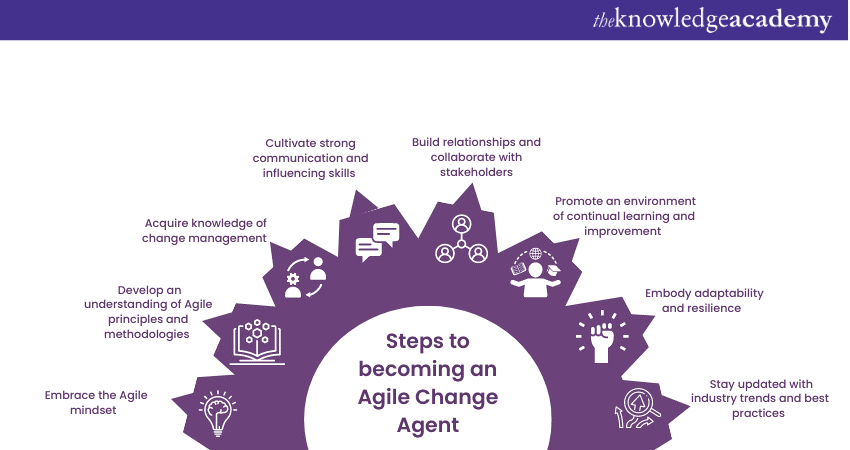We may not have the course you’re looking for. If you enquire or give us a call on 01344203999 and speak to our training experts, we may still be able to help with your training requirements.
Training Outcomes Within Your Budget!
We ensure quality, budget-alignment, and timely delivery by our expert instructors.

Modern organisations in the digital era achieve optimum efficiency in their Project Management processes by adopting Agile. Agile Project Management can be defined as a dynamic and iterative approach to Project Management that promotes flexibility, collaboration, and adaptability in organisations. As organisations strive to adapt to Agile, they require individuals who can effectively lead and navigate change initiatives with agility. This blog will present you with a step-by-step guide on everything you need to know about How to Become an Agile Change Agent.
Table of Contents
1) Steps to becoming an Agile Change Agent
a) Embrace Agile mindset
b) Develop an understanding of Agile principles and methodologies
c) Acquire knowledge of Change Management
d) Cultivate strong communication and influencing skills
e) Build relationships and collaborate with stakeholders
f) Promote an environment of continual learning and improvement
g) Embody adaptability and resilience
h) Stay updated with industry trends and best practices
2) Conclusion
Steps to becoming an Agile Change Agent
This section of the blog will tell you all you need to know about the steps you need to follow to become an Agile Change Agent.

Embrace Agile mindset
Embracing the Agile mindset is the first step towards becoming an Agile Change Agent. Some key aspects to consider are:
1) Customer-centricity: Prioritise the needs of customers. Understand their expectations and involve them in the decision-making process.
2) Collaboration: Promote a culture of collaboration and teamwork. Encourage open communication, shared responsibility, and cross-functional collaboration to achieve collective goals.
3) Iterative learning: Embrace the concept of continuous learning and improvement. Emphasise the importance of feedback loops, retrospectives, and adapting strategies based on insights gained.
4) Flexibility and adaptability: Embrace change as an opportunity for growth and improvement. Be open to new ideas, feedback, and evolving requirements.
Develop an understanding of Agile principles and methodologies
To become an Agile Change Agent, it's essential to have a comprehensive understanding of Agile principles and methodologies. Some key areas to focus on include:
1) Scrum: Familiarise yourself with Scrum, one of the most popular Agile frameworks. Understand the roles, ceremonies, and artefacts associated with Scrum.
2) Kanban: Learn about Kanban, a visual Agile framework for managing work. Understand concepts such as visual boards, work-in-progress (WIP) limits, and flow efficiency.
3) Lean: Explore Lean principles and practices, which aim to maximise customer value while minimising waste. Understand concepts like value stream mapping, continuous improvement, and just-in-time delivery.
Level up your Agile Change Management skills with our Agile Change Agent Course. Register now and become a catalyst for a successful transformation!
Acquire knowledge of Change Management
Change Management is a critical skill for an Agile Change Agent. Some important areas to focus on are:
1) Change Management principles: Study and understand established Change Management models, frameworks, and methodologies. This includes the ADKAR model, Kotter's 8-step Process, or the Prosci methodology.
2) Stakeholder analysis: Learn how to identify and analyse stakeholders' interests, concerns, and influence in the change process. Develop strategies to engage and involve stakeholders throughout the transformation journey.
3) Communication planning: Enhance your communication skills and learn how to create effective communication plans for different stakeholders.
4) Resistance management: Understand common sources of resistance to change and develop strategies to address them. Foster a supportive environment where concerns are addressed and individuals are encouraged to embrace change.
Cultivate strong communication and influencing skills
Being an effective communicator and influencer is crucial for an Agile Change Agent. Some key areas to focus on include:
1) Active listening: Practice active listening skills to understand the needs and concerns of individuals impacted by the change. Show empathy, ask clarifying questions, and demonstrate a genuine interest in their perspectives.
2) Clear and concise communication: Develop the ability to articulate complex ideas and concepts in a clear and concise manner.
3) Influencing without authority: Learn techniques to influence others without relying solely on formal authority. Build relationships, establish credibility, and use persuasive communication to gain support for change initiatives.
4) Negotiation skills: Enhance your negotiation skills to navigate conflicts and reach mutually beneficial agreements.
Unleash the true power of Project Management with our Agile Project Management Foundation and Practitioner (AgilePM) Course now!
Build relationships and collaborate with stakeholders
Building strong relationships and collaborating with stakeholders is essential for an Agile Change Agent. Some key points to consider are:
1) Stakeholder engagement: Identify key stakeholders and develop strategies to engage and involve them in the change process. Encourage active participation and create opportunities for open dialogue and collaboration.
2) Empathy and understanding: Seek to understand the perspectives, needs, and concerns of stakeholders. Show empathy and consider their input when making decisions or designing change initiatives.
3) Conflict resolution: Develop skills in managing conflicts and resolving disagreements among stakeholders. Foster an environment that encourages respectful communication and seeks mutually beneficial outcomes.
Promote an environment of continual learning and improvement
To be an effective Agile Change Agent, promote an environment of continual learning and improvement within your organisation. Consider the following:
1) Encourage learning opportunities: Advocate for training programs, workshops, and conferences that focus on Agile methodologies and Change Management.
2) Reflect and adapt: Encourage teams to regularly reflect on their work and identify areas for improvement. Emphasise the importance of adapting practices based on feedback and lessons learned.
3) Knowledge sharing: Foster a culture of knowledge sharing and collaboration. Encourage team members to share their experiences, best practices, and lessons learned with others.
Gain a comprehensive understanding of Agile methodologies with our Agile Overview Course – register today and embrace agility!
Embody adaptability and resilience
Being adaptable and resilient is crucial for an Agile Change Agent. Consider the following:
1) Embrace ambiguity: Learn to thrive in ambiguous and uncertain situations. Embrace change as an opportunity for growth and encourage others to do the same.
2) Manage stress: Develop strategies to manage stress and maintain resilience during challenging times. Encourage self-care and support others in maintaining their well-being.
3) Positivity and optimism: Maintain a positive outlook and encourage optimism among team members. Inspire confidence and motivate others, even in the face of obstacles.
Stay updated with industry trends and best practices
As an Agile Change Agent, it's important to stay updated with industry trends and best practices. Consider the following:
1) Continuous learning: Dedicate time to stay informed about the latest developments in Agile methodologies, Change Management, and related fields.
2) Networking: Engage in networking activities to connect with other Agile professionals and change agents. Make sure to share insights, exchange ideas, and learn from each other's experiences.
3) Professional development: Pursue certifications and professional development opportunities in Agile and Change Management. This demonstrates your commitment to continuous improvement and enhances your credibility as an Agile Change Agent.
Conclusion
In conclusion, Agile Change Agents are tasked with the responsibility of guiding organisations through Agile transformation. Though the process of becoming a Change Agent is not simple, following the aforementioned steps will give you a competitive edge. Hope this blog answered all your questions about How to Become an Agile Change Agent!
Gain an awareness of the basics of Agile Project Management and Agile Lifecycles by signing up for our Agile Project Management Foundation (AgilePM®) course now!
Frequently Asked Questions
Upcoming Project Management Resources Batches & Dates
Date
 Agile Change Agent
Agile Change Agent
Thu 6th Feb 2025
Thu 1st May 2025
Thu 11th Sep 2025
Thu 4th Dec 2025







 Top Rated Course
Top Rated Course



 If you wish to make any changes to your course, please
If you wish to make any changes to your course, please


